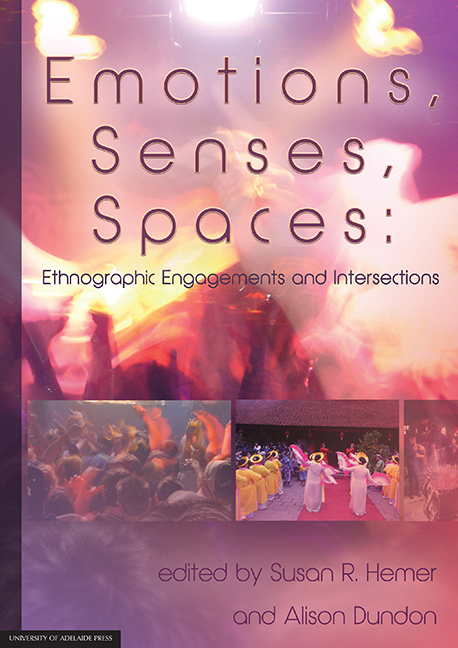Book contents
- Frontmatter
- Contents
- Biographies
- 1 Ethnographic intersections: Emotions, senses and spaces
- 2 ‘Dancing for joy’: Gender and relational spaces in Papua New Guinea
- 3 Creating the right ‘vibe’: Exploring the utilisation of space at Hip Hop concerts in Adelaide and Melbourne
- 4 Pontic dance: Feeling the absence of homeland
- 5 Emotional actors/Affective agents: Interspecies edgework and sociotechnical networks in the Spanish bullfight from horseback (rejoneo)
- 6 Sensual feasting: Transforming spaces and emotions in Lihir
- 7 Anxious spaces: The intersection of sexuality, the senses and emotion in fieldwork in Nepal
- 8 Interrupted research: Emotions, senses and social space in (and out of) the field
- 9 Voices in the park: The composition of sacred space and public place
- 10 Ngadha being-in-common: Emotional attachment to people and place in Flores, Indonesia
- 11 Trust your senses: Growing wine and making place in McLaren Vale
10 - Ngadha being-in-common: Emotional attachment to people and place in Flores, Indonesia
Published online by Cambridge University Press: 25 July 2017
- Frontmatter
- Contents
- Biographies
- 1 Ethnographic intersections: Emotions, senses and spaces
- 2 ‘Dancing for joy’: Gender and relational spaces in Papua New Guinea
- 3 Creating the right ‘vibe’: Exploring the utilisation of space at Hip Hop concerts in Adelaide and Melbourne
- 4 Pontic dance: Feeling the absence of homeland
- 5 Emotional actors/Affective agents: Interspecies edgework and sociotechnical networks in the Spanish bullfight from horseback (rejoneo)
- 6 Sensual feasting: Transforming spaces and emotions in Lihir
- 7 Anxious spaces: The intersection of sexuality, the senses and emotion in fieldwork in Nepal
- 8 Interrupted research: Emotions, senses and social space in (and out of) the field
- 9 Voices in the park: The composition of sacred space and public place
- 10 Ngadha being-in-common: Emotional attachment to people and place in Flores, Indonesia
- 11 Trust your senses: Growing wine and making place in McLaren Vale
Summary
Abstract
For the Ngadha people of Central Flores, Indonesia, residential clan land, nua, is imbued with emotional connections as the locus of Ancestors, ceremony and the key symbols of clan unity, the Ngadhu post and Bhaga miniature house. Prominently located in the centre of the nua, the Ngadhu and Bhaga are grounding symbols, constant reminders of interdependence between clan members and their Ancestors. This spiritual commons (McWilliam 2009) anchors emotional connections not just to place but also to fellow clan members, living and deceased. To articulate the emotional ties that bind clan members to one another, I draw on Nancy's concept of ‘being singular plural’ to illustrate that to be Ngadha is to have a keen sense of being implicated in the existence of others. Being with others is a human concern, as people cannot exist in the singular. For Ngadha people, this is particularly explicit, so that individual independence is not a coveted state of being; rather, being singular plural is the principal mode of existence. In this context, the nua is the central heartland for the spatial and material expression of clan unity, although the emotions of being singular plural transcend time and space.
Introduction
For the Ngadha people of Central Flores, Indonesia, residential clan land, nua, is imbued with emotional connections as the locus of Ancestors, ceremony and the key symbols of clan unity, the Ngadhu sacrificial post and Bhaga model house. Prominently located in the centre of the nua, the Ngadhu and Bhaga are grounding symbols, constant reminders of interdependence between living and deceased clan members. Bomolo nua, located on the outskirts of the town of Bajawa, exemplifies Ngadha configurations of material symbols, intangible associations and emotional connections. Bajawa has a population of approximately 15 000 and a small grid‑pattern of streets dotted with shops and government offices surrounded by private homes. Following a string road out of town, privately held residential blocks end abruptly at the edge of the corporately owned land of Bomolo. Entering Bomolo, the Ngadhu and Bhaga are striking features in the large nua square, which is bordered on all sides by houses facing into the square.
- Type
- Chapter
- Information
- Emotions, Senses, SpacesEthnographic Engagements and Intersections, pp. 159 - 174Publisher: The University of Adelaide PressPrint publication year: 2016

